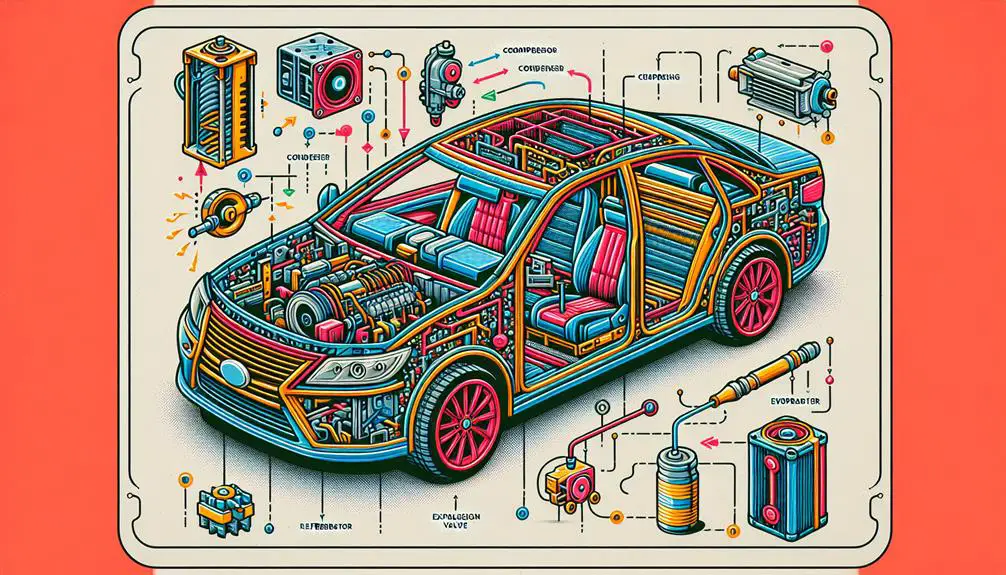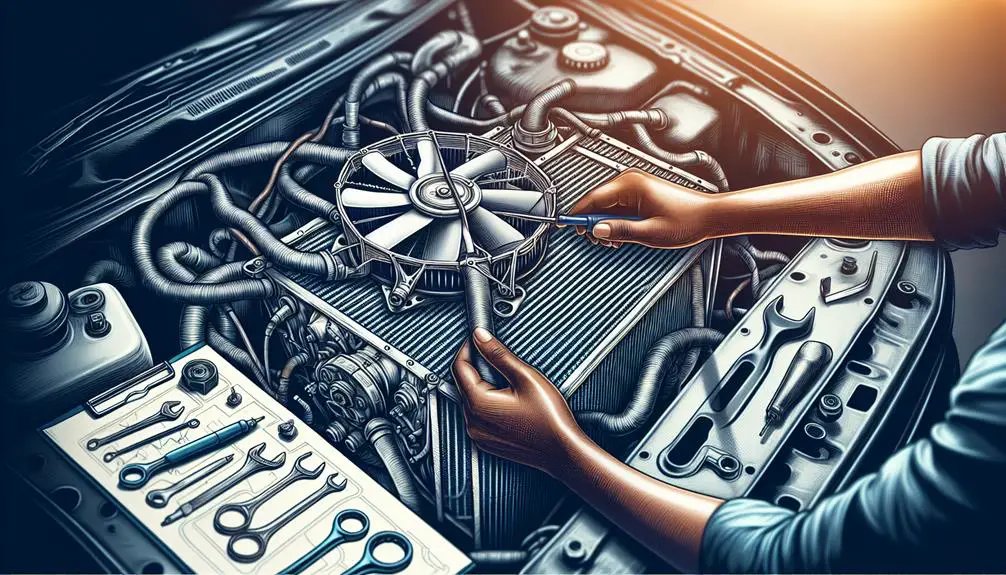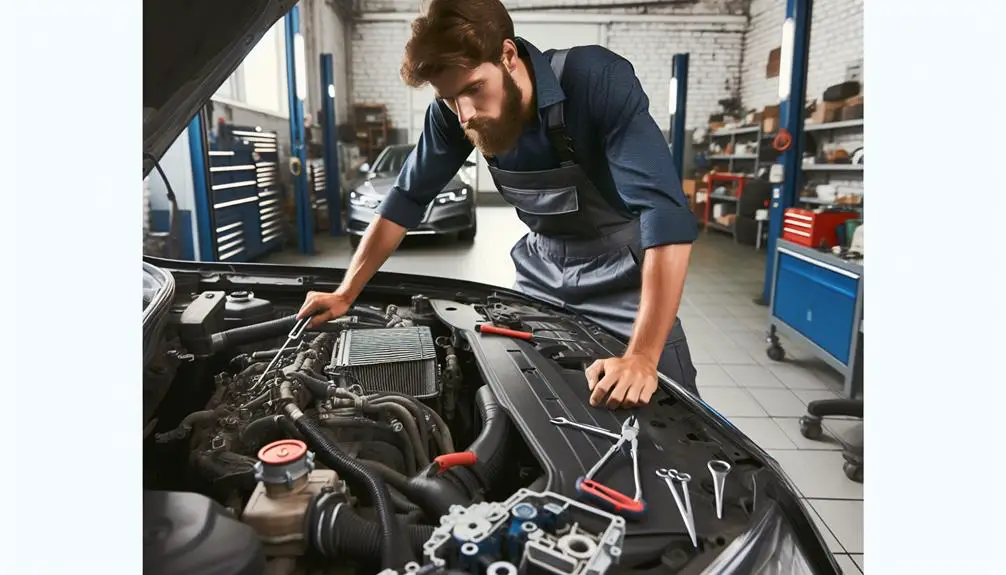Enhancing your car's cooling system involves several key steps:
- Understanding your car's AC
- Exploring DIY hacks
- Seeking professional help when necessary
- Adhering to regular maintenance
It is essential to follow these steps to ensure that your car's cooling system functions efficiently.
Understanding Your Car's AC

Before diving into how to improve your car's cooling system, it's vital to grasp how your vehicle's air conditioning (AC) operates. At its core, the AC system consists of several key components: the compressor, condenser, expansion valve, and evaporator. Each plays a critical role in cooling your car. The compressor pumps refrigerant through the system, while the condenser dissipates heat from the refrigerant, transforming it from a gas to a liquid. The expansion valve then controls the flow of refrigerant into the evaporator, where it absorbs heat from the cabin air, effectively cooling it.
Troubleshooting issues with your AC often starts with these components. If you're not feeling cool air, the problem might be as simple as a refrigerant leak or as complex as a failing compressor. Unusual noises when the AC is running can indicate a malfunctioning compressor, while a lack of cold air might suggest a clogged expansion valve or a leak in the system. Comprehending these components and their functions allows you to identify potential issues before they escalate, ensuring your AC system operates smoothly and efficiently.
Regular Maintenance Tips
Comprehending the components and functions of your car's AC system paves the way for implementing effective regular maintenance tips to keep it running efficiently. Key to this is monitoring fluid levels, including the refrigerant, which is vital for absorbing heat from your car's interior. You'll want to check these levels regularly, as low refrigerant can lead to a poorly performing AC system. If you're not sure how to check this, consult your car's manual or seek professional help.
Another important aspect is belt inspection. The serpentine belt, which drives the AC compressor, needs to be in top shape. Look for signs of wear such as cracks, fraying, or glazing. A damaged belt can fail, leaving your AC system inoperative. It's advisable to replace the belt at the earliest sign of wear to prevent unexpected breakdowns.
Moreover, keeping the AC system clean, including the evaporator and condenser coils, can prevent blocked airflow. Be sure to replace the cabin air filter as recommended by your vehicle's manufacturer. This filter helps to trap pollen, dust, and other airborne material from entering your vehicle through the cooling system, ensuring the air inside your car stays clean and fresh.
Upgrading Your Cooling System

To greatly improve your vehicle's cooling performance, consider upgrading key components of the AC system, including the compressor, evaporator, and condenser. These upgrades can substantially boost the efficiency and longevity of your car's cooling system. Here are four critical steps to take:
- Radiator Upgrades: Opt for a high-performance radiator with better heat dissipation capabilities. Aluminum radiators are lighter and cool more efficiently than standard ones. Look for models with larger cores and more cooling fins.
- Coolant Choices: Select a high-quality coolant with anti-corrosive properties. Consider coolants that are specifically designed for high-performance engines or those that operate in extreme temperatures. The right coolant can prevent overheating and improve thermal conductivity.
- Compressor Replacement: If your AC compressor is old or failing, replace it with a more efficient model. Modern compressors are designed to reduce load on the engine, thereby improving fuel economy and cooling performance.
- Condenser and Evaporator Upgrade: Replacing your condenser and evaporator with larger, more efficient models can greatly boost the cooling power of your AC system. Look for units that offer improved airflow and heat exchange capabilities.
DIY Cooling Hacks
For those seeking budget-friendly methods to improve their vehicle's cooling efficiency, several DIY hacks can be implemented using common household items and basic tools.
A simple yet effective technique involves the use of ice packs. Place these ice packs in front of the air vents inside your car. As the air conditioning system blows air, it'll pass over the ice packs, greatly lowering the temperature of the air entering the cabin. This method provides an instant cooling effect, especially beneficial during the initial minutes of your drive on a hot day.
Another impactful DIY hack is window tinting. Applying a tint to your car windows can drastically reduce the amount of heat entering your vehicle by reflecting sunlight away. It's important to select a tint that complies with your local laws regarding visibility and reflectivity. You'll need a tinting film, a squeegee, a utility knife, and a heat gun or hair dryer. Carefully measure and cut the film to fit your windows, clean the glass thoroughly, apply the film smoothly to avoid bubbles, and use the heat source to cure the tint onto the window. This DIY project not only improves cooling but also adds privacy and style to your vehicle.
Professional Help and Services

While DIY methods can greatly improve your car's cooling efficiency, seeking professional help guarantees top performance and compliance with automotive standards. Professionals bring a level of expertise and access to specialized tools that you mightn't have at your disposal. They're not only adept at AC troubleshooting but can also efficiently handle coolant leaks, ensuring that your car's cooling system operates at its best.
Here are four key services professionals can provide to improve your car cooling experience:
- Thorough AC System Check: This involves inspecting the entire air conditioning system for any issues, from the compressor to the evaporator. Professionals use advanced diagnostic tools to pinpoint problems accurately.
- Coolant System Service: Skilled technicians can flush and replace coolant, fix leaks, and repair or replace damaged components, ensuring your engine stays at an ideal temperature.
- Refrigerant Recharge: Professionals can accurately measure and replenish the refrigerant levels in your AC system, important for maintaining cool air output.
- Electrical Repairs: From fixing faulty switches and sensors to addressing wiring issues, expert services cover all electrical aspects that could affect your car's cooling system.
Opting for professional help not only resolves immediate concerns like AC troubleshooting and coolant leaks but also prevents future issues, keeping your car cool and comfortable.
Conclusion
Wrapping up, you've learned the ins and outs of your car's AC, from regular maintenance to potential upgrades.
Don't overlook simple DIY hacks that can bolster your cooling system's efficiency. Yet, if these steps seem challenging or if issues persist, seeking professional help is your best bet.
Remember, keeping your car's cooling system in top shape isn't just about comfort; it's about ensuring your vehicle runs smoothly and efficiently.
Stay cool and drive safe!